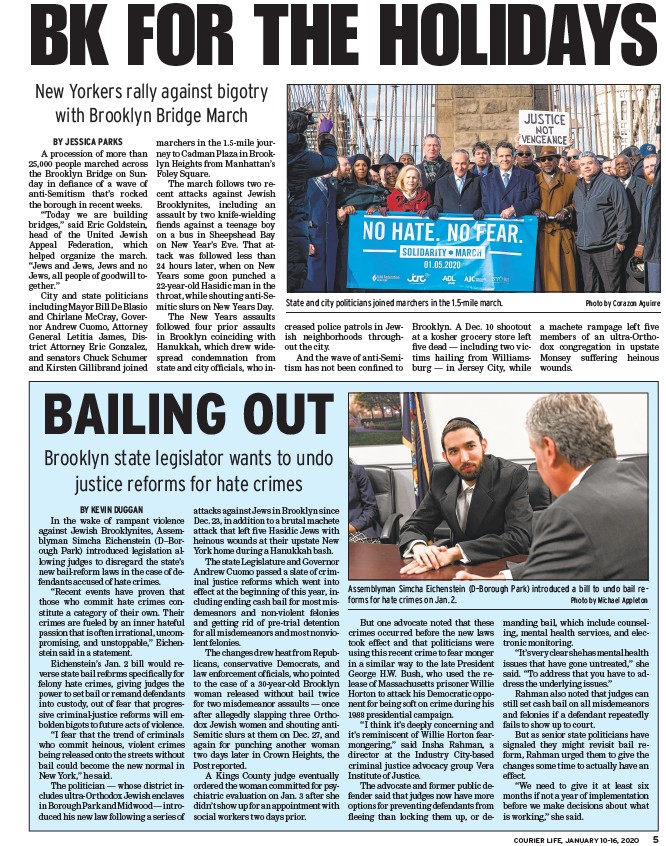
BK FOR THE HOLIDAYS
State and city politicians joined marchers in the 1.5-mile march. Photo by Corazon Aguirre
Assemblyman Simcha Eichenstein (D–Borough Park) introduced a bill to undo bail reforms
for hate crimes on Jan. 2. Photo by Michael Appleton
COURIER LIFE, JANUARY 10-16, 2020 5
New Yorkers rally against bigotry
with Brooklyn Bridge March
BY JESSICA PARKS
A procession of more than
25,000 people marched across
the Brooklyn Bridge on Sunday
in defi ance of a wave of
anti-Semitism that’s rocked
the borough in recent weeks.
“Today we are building
bridges,” said Eric Goldstein,
head of the United Jewish
Appeal Federation, which
helped organize the march.
“Jews and Jews, Jews and no
Jews, all people of goodwill together.”
City and state politicians
including Mayor Bill De Blasio
and Chirlane McCray, Governor
Andrew Cuomo, Attorney
General Letitia James, District
Attorney Eric Gonzalez,
and senators Chuck Schumer
and Kirsten Gillibrand joined
marchers in the 1.5-mile journey
to Cadman Plaza in Brooklyn
Heights from Manhattan’s
Foley Square.
The march follows two recent
attacks against Jewish
Brooklynites, including an
assault by two knife-wielding
fi ends against a teenage boy
on a bus in Sheepshead Bay
on New Year’s Eve. That attack
was followed less than
24 hours later, when on New
Years some goon punched a
22-year-old Hasidic man in the
throat, while shouting anti-Semitic
slurs on New Years Day.
The New Years assaults
followed four prior assaults
in Brooklyn coinciding with
Hanukkah, which drew widespread
condemnation from
state and city offi cials, who increased
police patrols in Jewish
neighborhoods throughout
the city.
And the wave of anti-Semitism
has not been confi ned to
Brooklyn. A Dec. 10 shootout
at a kosher grocery store left
fi ve dead — including two victims
hailing from Williamsburg
— in Jersey City, while
a machete rampage left fi ve
members of an ultra-Orthodox
congregation in upstate
Monsey suffering heinous
wounds.
BAILING OUT
BY KEVIN DUGGAN
In the wake of rampant violence
against Jewish Brooklynites, Assemblyman
Simcha Eichenstein (D–Borough
Park) introduced legislation allowing
judges to disregard the state’s
new bail-reform laws in the case of defendants
accused of hate crimes.
“Recent events have proven that
those who commit hate crimes constitute
a category of their own. Their
crimes are fueled by an inner hateful
passion that is often irrational, uncompromising,
and unstoppable,” Eichenstein
said in a statement.
Eichenstein’s Jan. 2 bill would reverse
state bail reforms specifi cally for
felony hate crimes, giving judges the
power to set bail or remand defendants
into custody, out of fear that progressive
criminal-justice reforms will embolden
bigots to future acts of violence.
“I fear that the trend of criminals
who commit heinous, violent crimes
being released onto the streets without
bail could become the new normal in
New York,” he said.
The politician — whose district includes
ultra-Orthodox Jewish enclaves
in Borough Park and Midwood — introduced
his new law following a series of
attacks against Jews in Brooklyn since
Dec. 23, in addition to a brutal machete
attack that left fi ve Hasidic Jews with
heinous wounds at their upstate New
York home during a Hanukkah bash.
The state Legislature and Governor
Andrew Cuomo passed a slate of criminal
justice reforms which went into
effect at the beginning of this year, including
ending cash bail for most misdemeanors
and non-violent felonies
and getting rid of pre-trial detention
for all misdemeanors and most nonviolent
felonies.
The changes drew heat from Republicans,
conservative Democrats, and
law enforcement offi cials, who pointed
to the case of a 30-year-old Brooklyn
woman released without bail twice
for two misdemeanor assaults — once
after allegedly slapping three Orthodox
Jewish women and shouting anti-
Semitic slurs at them on Dec. 27, and
again for punching another woman
two days later in Crown Heights, the
Post reported.
A Kings County judge eventually
ordered the woman committed for psychiatric
evaluation on Jan. 3 after she
didn’t show up for an appointment with
social workers two days prior.
But one advocate noted that these
crimes occurred before the new laws
took effect and that politicians were
using this recent crime to fear monger
in a similar way to the late President
George H.W. Bush, who used the release
of Massachusetts prisoner Willie
Horton to attack his Democratic opponent
for being soft on crime during his
1988 presidential campaign.
“I think it’s deeply concerning and
it’s reminiscent of Willie Horton fearmongering,”
said Insha Rahman, a
director at the Industry City-based
criminal justice advocacy group Vera
Institute of Justice.
The advocate and former public defender
said that judges now have more
options for preventing defendants from
fl eeing than locking them up, or demanding
bail, which include counseling,
mental health services, and electronic
monitoring.
“It’s very clear she has mental health
issues that have gone untreated,” she
said. “To address that you have to address
the underlying issues.”
Rahman also noted that judges can
still set cash bail on all misdemeanors
and felonies if a defendant repeatedly
fails to show up to court.
But as senior state politicians have
signaled they might revisit bail reform,
Rahman urged them to give the
changes some time to actually have an
effect.
“We need to give it at least six
months if not a year of implementation
before we make decisions about what
is working,” she said.
Brooklyn state legislator wants to undo
justice reforms for hate crimes